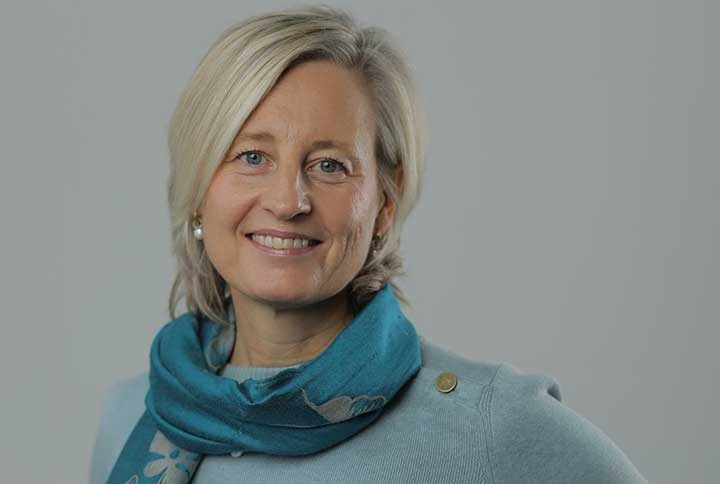Katja Fall - new professor 2021

Katja Fall is professor of clinical epidemiology. She researches risk factors for cancer and factors that affect patients affected by cancer. One premise is to link risk factors in adolescence with the risk of cancer later in life.
Facts:
1971 Born in Linköping, Sweden
2004 Obtained her PhD in cancer epidemiology at Karolinska Institutet with her thesis Medical interventions and gastric cancer – an observational approach
2004 Postdoctoral fellow at Karolinska Institutet
2007 Postdoctoral Fellow at Harvard School of Public Health
2013 Associate Professor in clinical epidemiology at Örebro University
2020 Professor of clinical epidemiology at Örebro University
Katja Fall had intended to become a doctor. Still, she found herself on the epidemiological research track on a coincidence during her medical training in Uppsala.
“I was lucky to end up in a creative environment with very competent and inspiring role models. I discovered I enjoyed the ideas, methods, people, and opportunities that research opened up for me.”
After finishing her general practice work, she chose – after some consideration – to devote herself to full-time research. Her doctoral thesis deals with how chronic inflammation, antibiotics and anti-inflammatory drugs can affect the risk of stomach cancer.
“The studies included register and journal studies and bacterial culture. The results supported that prolonged inflammation of the gastric mucosa, which may occur, for example, due to an infection with ulcer bacterium H. pylori, may play a role in the development of stomach cancer,” explains Katja Fall.
Taste for epidemiology
In addition to the interest in inflammation, infection and cancer, the thesis work gave more taste to epidemiology.
“It’s interesting to have the entire population as a patient instead of an individual. That’s why I continued that track, but my main focus shifted from stomach to prostate cancer.”
In 2007, she got the chance to swap Karolinska Institutet and Stockholm for Harvard and Boston. She met new inspiring colleagues and became interested in how mental stress can affect health, especially cancer.
“It’s challenging because of the difficulty in measuring stress to evaluate the possible impact on health. Unfortunately, many previous studies have weaknesses just when it comes to it. To get around them, we have tried different strategies,” says Katja Fall.
Stress resistance among patterning men
Researchers have used information about stress resistance among patterning men from the Swedish military register. Among other things, they saw that low-stress resistance to the pattern could be linked to an increased risk of liver and lung cancer later in life, which could be explained by people with low stress tolerance smoking more.
“We have also investigated beta-blockers, a type of blood pressure medication, that inhibit stress-related signalling pathways. The studies show a link between these and better survival for certain types of cancer.”
Today, she works with many different studies – but a common denominator for several is that they deal with risk factors for cancer or factors that affect patients affected by cancer. One theme is to study risk factors in adolescence linked with cancer risk later in life.
Long follow-up needed
“One challenge, of course, is that extended follow-up of the people we study is needed. We can achieve this by linking different national registers.”
The researchers are currently conducting a study registering stress in men under testing for suspected prostate cancer. The aim is to study how men are affected by the investigation and care and, as a result, their mental well-being and possible cancer risk.
“Once again, one challenge is measuring stress, and we try several different methods, both in the form of questionnaires and measuring different biomarkers.”
At the same time, it has been a different last year with the corona pandemic – especially for epidemiologists.
Hard not to get involved
“As an epidemiologist, I think it’s difficult not getting involved in work related to the pandemic. Since I’m used to studying diseases that develop over a long time, I’m enthralled by literally being in the centre of a disease outbreak in real-time,” says Katja Fall.
She has followed the development of knowledge and conducted studies investigating how men with prostate cancer are affected by COVID-19. In addition, they examine whether treatment with anti-androgenic drugs can affect the risk of falling ill and becoming seriously ill.
“Men are hit harder than women, and there are theories that male sex hormone can play a role.”
“One of the best things about being a researcher is that being curious at work is encouraged, and there’s always a possibility to learn something new. And hopefully contributing to improved health.”
Among the best is meeting students
“Of course, one of the absolute best is to meet students at different levels. It is a pleasure to convey what I know about epidemiology and at the same time learn new things together.”
Sweden is considered a utopia for epidemiologists thanks to national health registers offering unique opportunities for high-quality research.
“I see a bright future both in terms of opportunities for increased knowledge about various diseases and for students who want to educate themselves and work in the field of epidemiology,” says Katja Fall.
